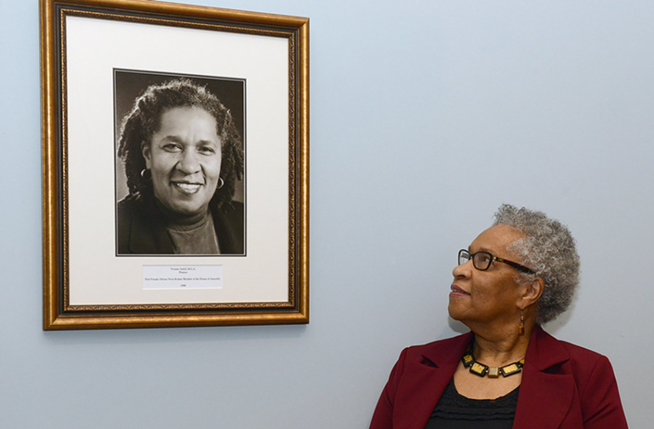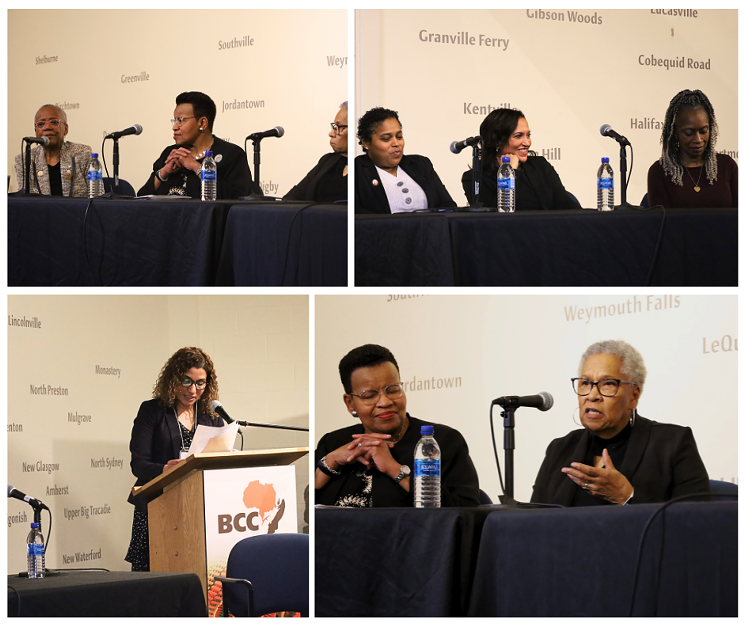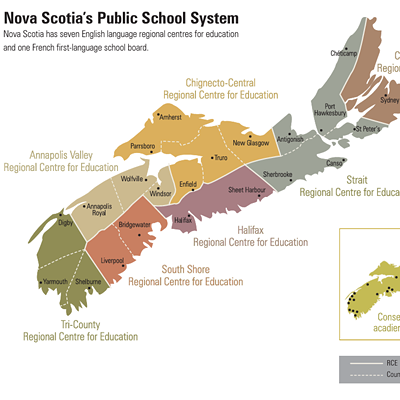On Wednesday evening, the Black Cultural Centre was filled with buffet tables of food and rows of chairs facing a long table with six microphones. The table of panelists wore their political bona fides with grace and power–all six are Black Nova Scotian women who work, or worked, in politics and community advocacy.
They're here to share their experiences working in government: how they first became political, barriers they faced–and smashed–while campaigning, what they learned on the job and advice to young Black politicians of the future.
Their collective message to the audience is for other Black Nova Scotians to think about joining politics because, it “isn’t something you just start,” says panelist and former MLA for Preston, Yvonne Atwell. Rather, politics is the collection of steps leading you to where you need to go, such as social organizing in your community.
The panelists’ call is to those they hope will follow in their historic footsteps. And furthermore, why not politics?
Says Atwell, “I always thought, ‘I can do this,’ because I could never figure it out ‘why not?’ I never thought about my colour in that way. I never thought about coming from East Preston in that way.”
Atwell made history in 1998 when she became the first Black Nova Scotian woman elected to the Nova Scotia House of Assembly. But Atwell’s political career goes back to her involvement her kids’ schools in Toronto. She moved there from Nova Scotia in the 1960s. “I kind of fell into politics not really thinking about it in any major way.”
Atwell and three other women who worked at the hospital were part of a union called the Food Supervisors Association, whereas the women working in nursing homes were not and had lower wages for just as much work. “We decided that the women that worked in hospitals would support the women who were working in nursing homes.”
Atwell and these three other women started a group to advocate for a job that was “99% done by women,” but wasn’t getting the recognition or support for the important work they were doing, essentially running these homes. “It took a while,” says Atwell. “We fought for it.”
Atwell’s small group built a constitution ticket that travelled across Ontario to all other nursing homes to be ratified under their union. They were successful.
In 1984, Atwell returned home to Nova Scotia. She started working with small community organizations. She began talking with those around her, telling herself, “Maybe you can make your voice larger, bigger and say more.” Atwell is a longtime organizer for restorative justice for youth in Nova Scotia as well as making history in the legislature. Atwell’s portrait was added to the Province House lobby in 2022.

Following Atwell’s ceiling shattering, it took 23 years until two more African Nova Scotia women were elected into the house. In 2021, Suzy Hansen was elected for Halifax-Needham and Angela Simmonds was elected for Preston, in a provincial election that saw a record-high of four Black MLAs elected to the house.
For Hansen, her political career also began to take root with her kids. “My road has always been about advocating and speaking up for those that don't always have that voice. I realized having children that you have to advocate twice as hard.” Hansen has seven children. She was elected to the school board in 2016 to represent Halifax North-Fairview. She consistently pushed back while on the board, “about how our young people were being treated in our public school system, specifically in my riding, and how they were being overlooked on numerous occasions and getting the short end of the stick.”
Hansen has worked with the Phoenix Youth Programs for many years, which is a group supporting and advocating for the needs of youth aged 11-24 and their communities. After being elected in 2021, Hansen has become the NDP spokesperson for education and early childhood development and their caucus chair. “I knew there was an importance for me to be in a position where I could make decisions.”
Hansen says the first week in the house “was a whirlwind,” as she was learning on the job how to stay above the partisan fray of quick jabs back and forth across the aisle, while preparing for her “maiden speech” that would be her introduction to other MLAs in the house.
Her trepidation of how she would sound or what she should say disappeared when she realized, “I’m here to represent these folks who elected me to be here. I'm not here for all of this extra stuff. I'm here to speak for my people, and over 5000 people voted for me to be in the seat, so, no one in this room was going to intimidate me.
“The people will decide whether I'm here or not, and not the other legislators over there."
After the first weekend in the house, Hansen decided to write her speech the way she wanted and to say what she needed to say for her constituency. Hansen describes feeling like, “I don’t belong here, I don’t belong here,” during the beginning because, “first, there wasn’t a Black woman’s face on the wall [yet] and secondly, there was a Black man’s face on the wall…but there was no representation around the room other than us four who were elected, and we’re not all in the same party,” says Hansen of her cohort of four Black MLAs in 2021. The four are Suzy Hansen for the NDP, Ali Duale, Tony Ince and Angela Simmonds for the Liberals.
Once that feeling of inadequacy had left Hansen, the four Black MLAs “gained really good relationships and we forged something that I think they weren't ready for.”
When Simmonds joined the house in 2021, she became the first Black woman selected as deputy speaker of the house.
“The difficult part was really knocking on the doors and getting the question, ‘How can a Black woman represent me,’” recalls Simmonds of her successful MLA campaign in 2021.
In 2014, Simmonds published This Land is Our Land: African Nova Scotian Voices from the Preston Area Speak Up," as a law student at Dalhousie. The document presents interviews with community members about how the historic land ownership of Preston residents are not being respected because of anti-Black racism and oppression, and recommends a community land trust be established.
Simmonds finds it ironic that, while she was campaigning in a district that didn’t question how a white man could represent Black people for 20 years, when a Black woman showed up, they were asking, “‘How can you represent me?’ I’m thinking, ‘Y’all, we’re talking about housing and education–I don’t think it matters,” what colour her skin is. What they should be asking, she says, is, “can I advocate for the issues that matter? ‘Yes.’” The ignorance she encountered campaigning built her confidence because she realized, “‘I know way more than you if that’s the question you’re asking me.“
Simmonds stepped down from the house in April 2023, triggering a byelection for Preston. That’s how Twila Grosse became Nova Scotia’s first Black woman cabinet minister.
“If you’ve got a couple hours, I’ll tell you how I got started,” Grosse jokes to the audience. Grosse grew up in Cherry Brook, where the BCC is located. Grosse says that if you’d have asked her last year if politics was for her, “I would have said no–but last April, I was actually sought out,” by the PC party of Nova Scotia, with premier Tim Houston asking to speak with Grosse directly.
Grosse is a retired budget analyst, business manager and accountant, working 36 years with the Halifax Stanfield International Airport. She sits on the board of the BCC.
When Houston asked Grosse to run in 2023, she thought it was crazy. “But, the more I thought about it and engaged with folks, the more I thought, ‘Maybe, just maybe, this is for you.’” She told her mother, who was 88, that she was thinking about running in the byelection.
“She didn’t say much,” says Gross. “I said ‘Did you hear me?’ She said, ‘Yes, I heard you, but Twila, in such a time as this,’ is simply what she said, ‘what do you have to lose?”
Grosse is minister of African Nova Scotian Affairs and for the Public Service Commission. She is the first Black MLA for the province’s PC party. “As Black women in politics, I'm saying to the community, ‘Please get behind us,'" says Grosse. "'Please support us, because we need you. That is the very thing that keeps us going.’
On Grosse’s left sits senator Wanda Bernard–the first African Nova Scotian woman named to the Senate of Canada in 2016, representing Nova Scotia. Before politics, Bernard was a social worker in East Preston. She became the first Black Canadian to become a tenured, full professor at Dalhousie. Bernard also co-founded the Association of Black Social Workers in the 1970s.
“When I faced the ‘concrete ceiling,’” says Bernard about entering federal politics as a Black woman, “it made me pause, because I certainly knew about glass ceilings, and had broken a few–but I had no idea that once I broke through the glass ceiling then I would actually face concrete.”
In 2015 Justin Trudeau became Canada’s Prime Minister and vowed to make senators be appointed by an independent body, allowing for more diversity. Bernard wasn’t sure, but her husband encouraged her everyday, saying “He’s looking for people like you.”
And so, she thought, “‘What do I have to lose? I have faced a concrete ceiling. What do I have to do?” Spending 30 years inside Dalhousie University, she learned how to navigate institutional barriers in “systems that weren’t set up for us to be in.”
Now, she’s advocating for more Black representation in the Senate. “When I arrived, I was the third African Nova Scotian in the Senate,” says Bernard. “One of the things that I set out to do was to make sure we have more senators of African descent.
“Two weeks ago, we had a photo taken. There are now seven African Canadian women in the Senate. Did you hear what I said? There are seven African Canadian women in the Senate. There has not been a Black man appointed to the Senate in the last seven years. And guess what? There's only one person asking questions about that. And I ask those questions every chance I get.
“I've made a commitment that I will continue to ask questions until there's another Black man appointed in that place…while I'm there. I've got four years.”
On the opposite end of the table of six panelists sits Iona Stoddard, HRM’s first Black city councillor, elected in 2020 for District 12 which includes the historic Black community of Beechville.
Stoddard admits she didn’t start off thinking about politics. In 2016, there was an empty seat on city council as the previous councillor had retired. Through talking it out with family, Stoddard set herself a goal to get elected–and she did. She says she experienced imposter syndrome, at times, but having a historic Black community, Beechville, in her riding “was another push for me because I thought, ‘Well, here's the Black community–they need representation.’”
Stoddard is also proud that when she was elected, itit was part of gender parity. Eight women and eight men. “Another first,” she says. “I tell everybody, ‘We didn't just break the glass ceiling, we smashed it.’”
Stoddard tells the BCC audience that councillor Lindell Smith of Halifax North is “unfortunately stepping down from his position,” and encourages other Black Nova Scotians to put their name in as she did. “Just think about it.
“My goal is to talk to little Black girls, young Black women, women of color, and say, ‘You can do it–don't let anybody tell you you can't.’”
The event was hosted by Maki Motapanyane, the Women’s Studies Department chair at Mount Saint Vincent University and Rielle Simone Williams, the assistant director of the BCC.
Watch the full panel discussion here:











